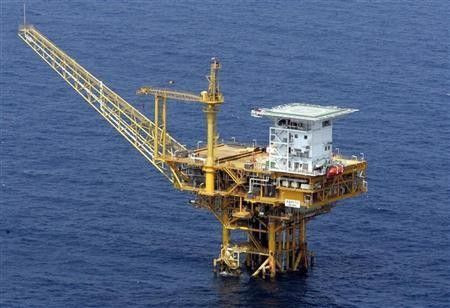Libya's oil output cut by up to 75 pct

Turmoil in Libya has slashed its oil output by 75 percent or 1.2 million barrels per day, key Libyan oil sector player ENI said on Thursday.
This is the highest estimate to date of Libya's crude production reduction and has added steam to oil's price rally.
Oil surged on Thursday to near $120 a barrel because of the disruption , even though OPEC's leader Saudi Arabia has said it is willing to make up for any shortages while trading sources questioned ENI's high Libyan outage estimate.
ENI Chief Executive Paolo Scaroni said the unrest in Libya had both cut production and triggered speculation in the market. ENI is Libya's biggest foreign oil operator and has had to cut some Libyan output, as have a number of rivals.
Naturally there is speculation which is amplifying a real phenomenon. The real phenomenon is there are 1.2 million barrels less on the market which is not a huge thing, but it is something and there is also a sense of general uncertainty in the region which can be the trigger for speculation, he told reporters in Rome.
A spokesman for ENI later clarified that Scaroni's remarks indicated Libyan daily output had fallen by 1.2 million barrels.
ENI's estimates were three times more than previous figures given by oil companies and industry sources, which had indicated more than 400,000 bpd of Libyan output had been stopped, according to Reuters calculations.
The north African OPEC member normally produces about 1.6 million bpd of high-quality oil, or almost 2 percent of world output. About 1.3 million bpd is exported, mainly to Europe.
Scaroni also said the unrest had more than halved Eni's Libyan gas and oil production, cutting it to 120,000 barrels of oil equivalent per day (boepd) from 280,000 boepd normally.
CONTACTS DIFFICULT
Some oil industry sources were not immediately able to identify shut Libyan operations that would amount to a supply cut of 1.2 million bpd.
Libyan oil officials could not be reached. Shokri Ghanem, head of the National Oil Corporation and Libya's top energy official, was not available on Thursday to comment.
Oil firms are struggling to find out the extent of the disruption because they cannot get through to their offices and operations in Libya.
Contacts with our people are very difficult. The internet is down and phone lines are not working, said one company source. Part of our output, not all, is shut. They are checking what the situation is exactly.
Most of Libya's oil production operations are in the east of the country south of Benghazi. That city and most of eastern Libya have not been under central control since an uprising last week against the rule of Libyan leader Muammar Gaddafi.
Oil surged more than 7.5 percent to its highest since August 2008 on Thursday.
Certainly the Libyan crisis is playing a role in this sudden surge in prices but this has no bearing on the security of supplies, Scaroni said.
He said oil prices would fall below $100 a barrel if the international situation normalised.
Austria's OMV said on Wednesday it might be heading for a full production shutdown in Libya. Total, Repsol and BASF have also said they are either slowing or stopping output.
Repsol said on Thursday it was still producing in Libya although gross production at blocks it is invoved in had been reduced to 160,000 bpd from 360,000 previously.
U.S. companies produce more than 100,000 bpd from Waha fields and consortium member Occidental Petroleum said output continued.
© Copyright Thomson Reuters 2024. All rights reserved.





















